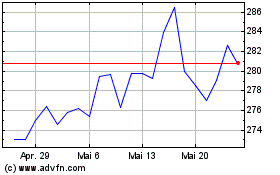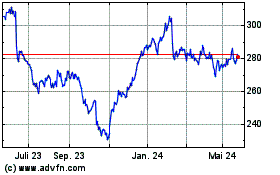Covid-19 Vaccine Candidate Scrapped After False Positives on HIV Tests
11 Dezember 2020 - 1:57AM
Dow Jones News
By Mike Cherney
SYDNEY -- A Covid-19 vaccine candidate in Australia has been
scrapped because recipients returned false positives on certain HIV
tests, underscoring the difficulties scientists face in rapidly
developing an inoculation for the coronavirus.
The vaccine candidate, called v451, was being jointly developed
by the University of Queensland and CSL Ltd., an Australia-based
biopharma company that also runs blood-collection centers in the
U.S. The Australian government had agreed to buy 51 million
doses.
The episode illustrates why governments have sought access to
multiple vaccines and more doses than needed for their populations.
Some vaccines might not prove effective, adverse reactions might
arise and manufacturing constraints could limit how many doses can
be produced.
The U.K. already has granted emergency authorization to
distribute the Pfizer Inc. and BioNTech SE vaccine, and the U.S.
could do so shortly. In Australia, however, community transmission
of the virus is negligible after international borders were shut
and stringent local lockdowns were imposed, so officials say there
was no need for a similar emergency-use authorization.
"We can take our time," Australian Health Department Secretary
Brendan Murphy said. "We're in a good position because we've
controlled the virus."
The v451 vaccine relied on "molecular clamp" technology, which
stops spike proteins on the coronavirus from uncoiling, according
to CSL. Recipients develop antibodies to the coiled shape. The
vaccine, however, involved the use of an HIV protein, causing some
recipients to generate the antibodies that created the false
positives on the HIV tests.
Researchers said there is no possibility the vaccine causes an
actual HIV infection, and follow-up tests confirmed no HIV virus
was present in the recipients. In addition, they said there were no
serious adverse events or safety concerns in the 216 people who
participated in the Phase-One trial, and that the vaccine created a
robust response to the coronavirus.
"Many readers will look at this and say, 'Oh my God, these
vaccines aren't safe,' " said Nancy Baxter, a clinical
epidemiologist and head of the Melbourne School of Population &
Global Health at the University of Melbourne, who wasn't involved
in the trial. "It's super important that this wasn't anything to do
with the safety of the vaccine."
The researchers said it would take another 12 months to
re-engineer the vaccine and fix the issue, which would have taken
too long. Rolling out the vaccine in its current form would have
required significant changes to HIV- testing procedures. That
prompted authorities to decide it wasn't worth progressing the
vaccine to a more advanced clinical trial.
The v451 vaccine was one of four that the Australian government
had agreed to buy if proven effective. Australian officials said
Friday that they hadn't bet on all four vaccines getting through
the approvals process.
"If that had occurred, that would have been truly
extraordinary," Australian Prime Minister Scott Morrison said.
"That's why we spread our risk."
Mr. Morrison said Friday that Australia had increased its orders
for two of the vaccines still under consideration. One of those
vaccines, from Oxford University and AstraZeneca PLC, is being
manufactured by CSL in Australia, reducing supply-chain risks. In
total, Health Minister Greg Hunt said Australia had access to more
than 140 million doses, more than enough to cover a population of
roughly 25 million.
Australian officials have said they expected vaccines to be
approved for use early next year and the first inoculations of
vulnerable populations to occur in March. Mr. Hunt said Friday that
dropping the v451 vaccine would enable manufacturers to speed up
production of the other vaccines, meaning that a nationwide vaccine
rollout could be completed more quickly than anticipated.
Researchers knew a possibility existed that the v451 vaccine
candidate could create false HIV positives, though the risk was
seen as being extremely low at the start of the study, Dr. Murphy
said. During the Phase-One trial, researchers were surprised by the
prevalence of false positives, he said.
"It was likely to be a promising vaccine, it was likely to
work," Dr. Murphy said. "But we knew that we didn't want to have
any issues with confidence."
Write to Mike Cherney at mike.cherney@wsj.com
(END) Dow Jones Newswires
December 10, 2020 19:42 ET (00:42 GMT)
Copyright (c) 2020 Dow Jones & Company, Inc.
CSL (ASX:CSL)
Historical Stock Chart
Von Dez 2024 bis Jan 2025

CSL (ASX:CSL)
Historical Stock Chart
Von Jan 2024 bis Jan 2025
